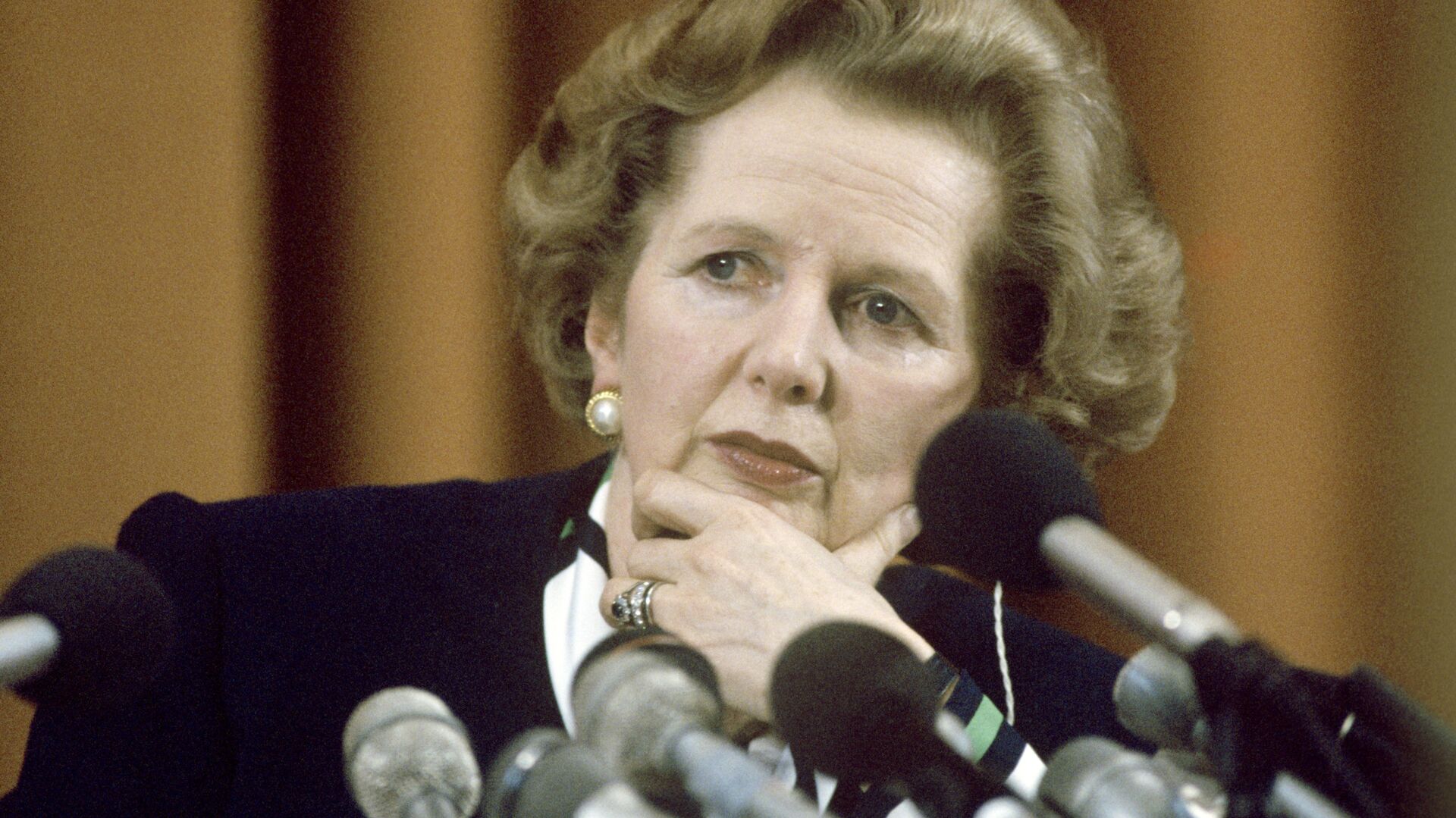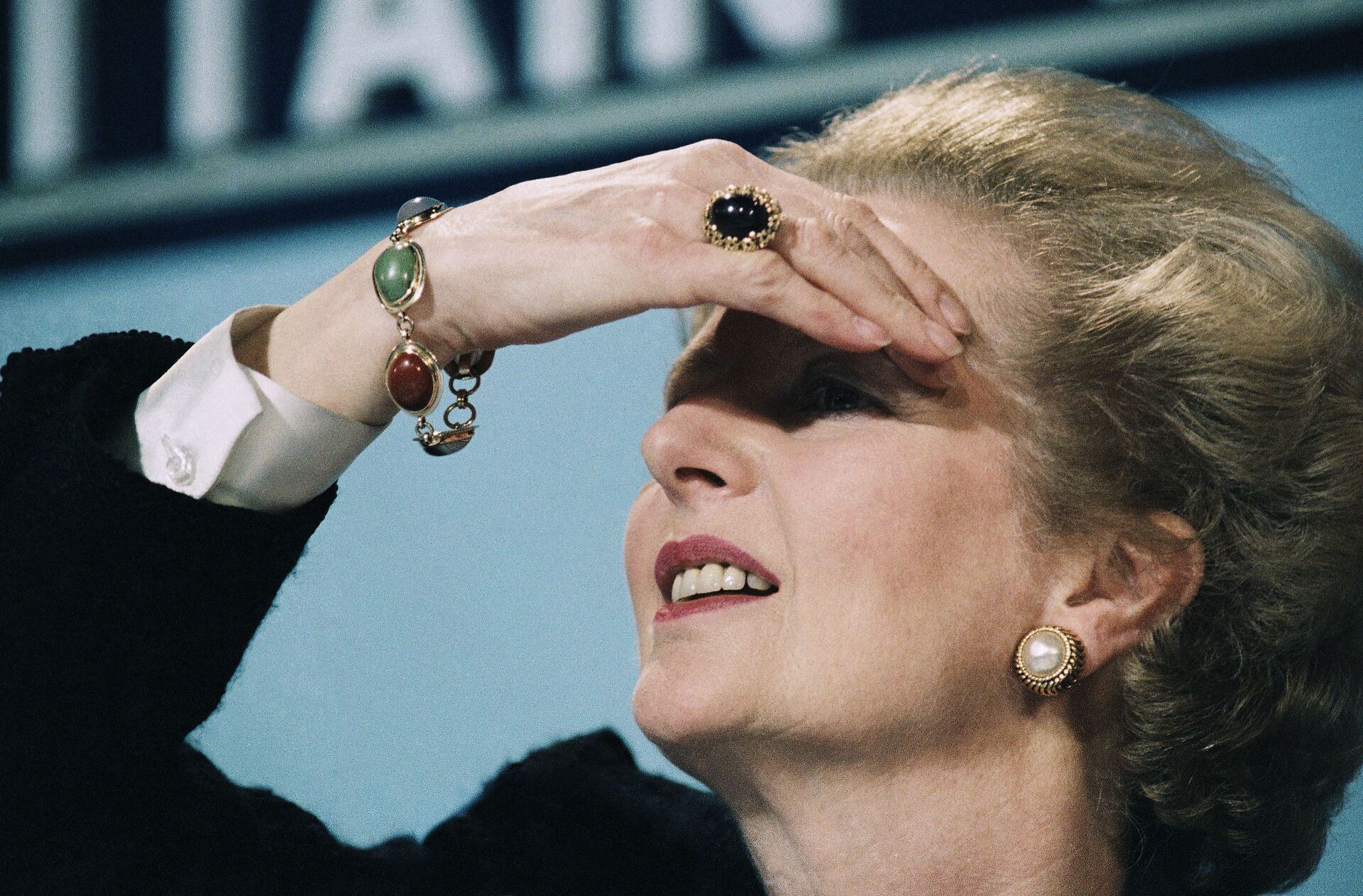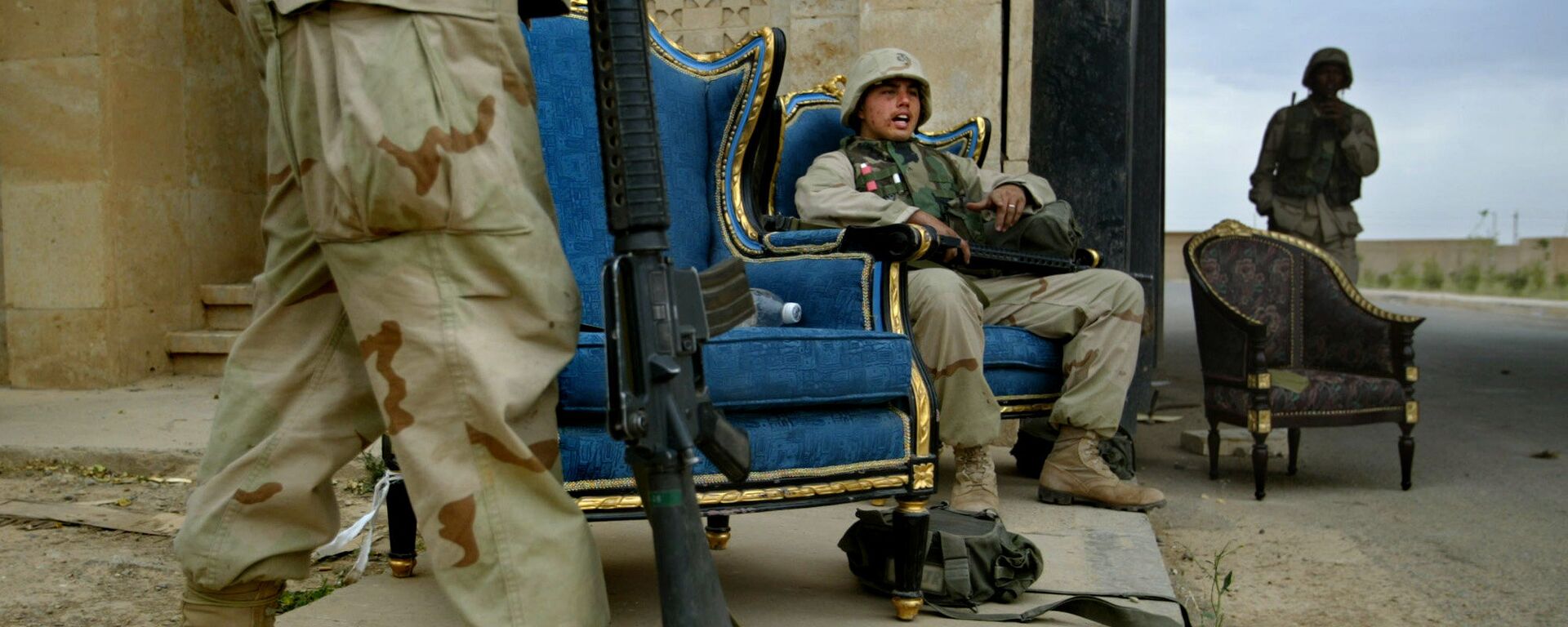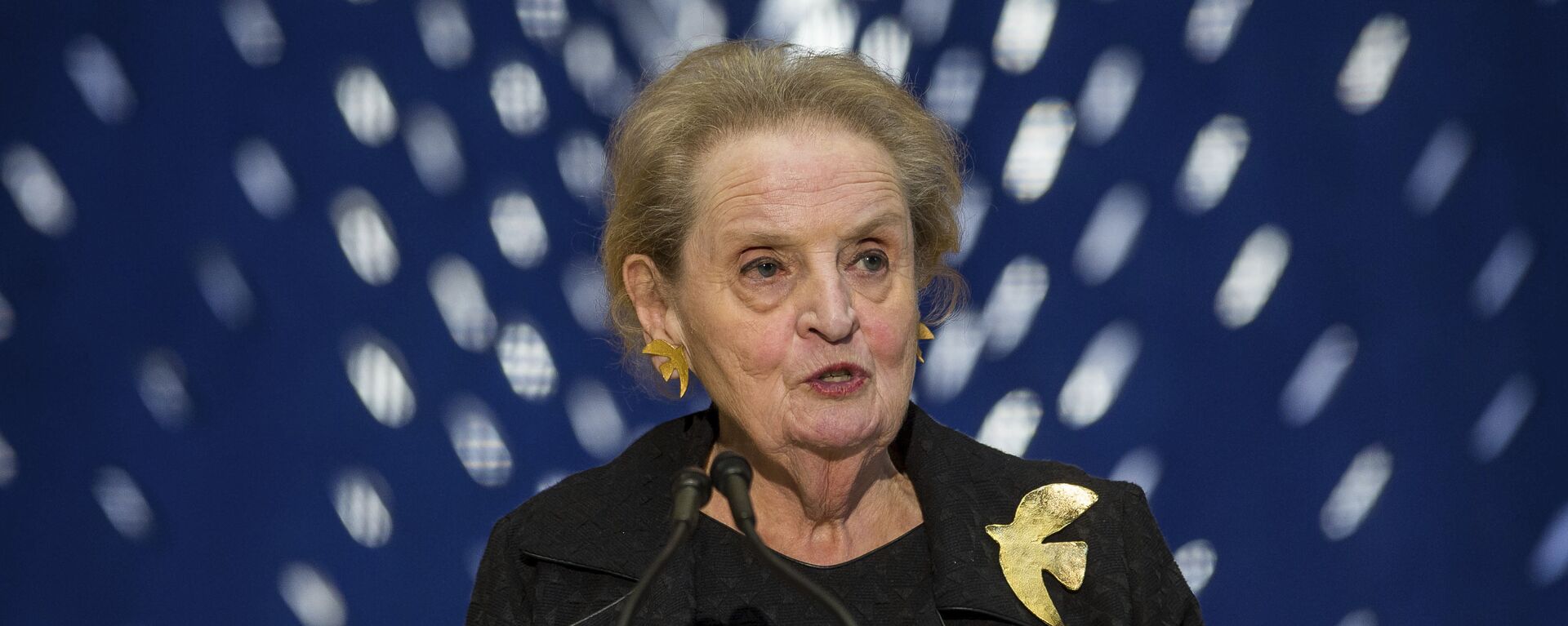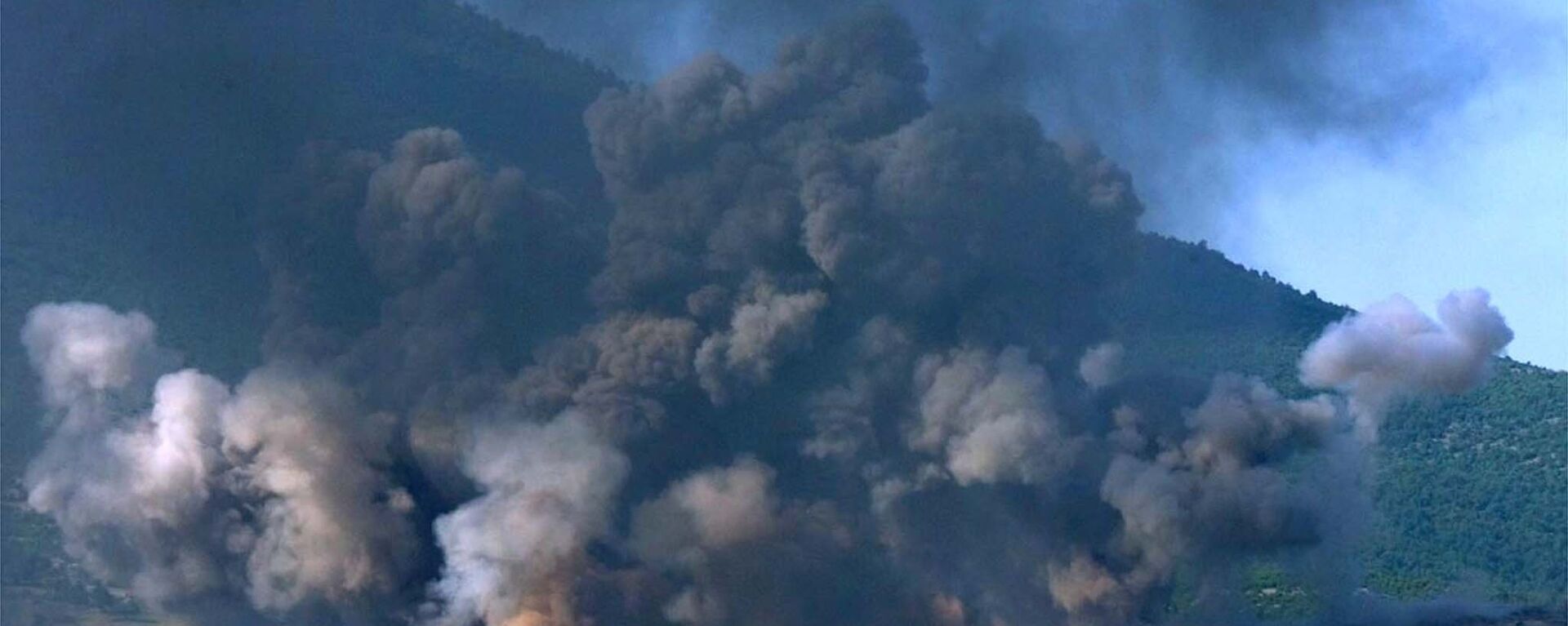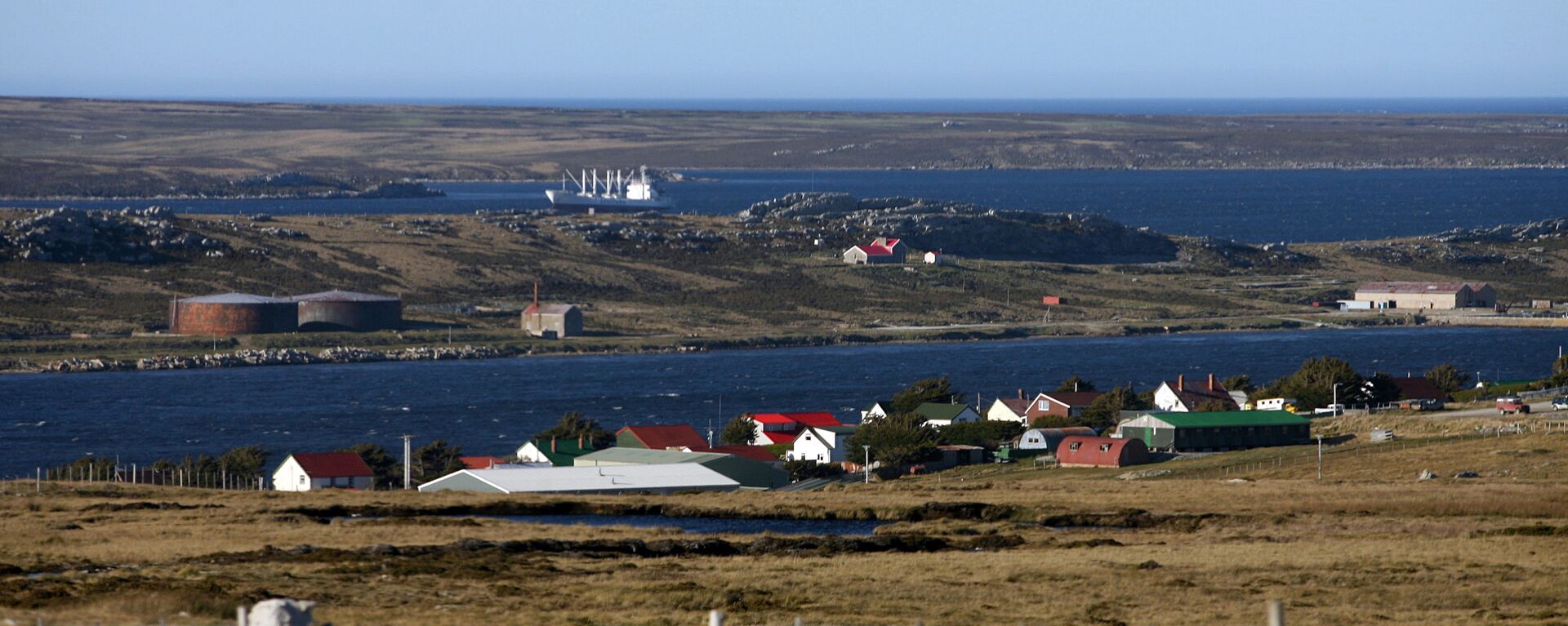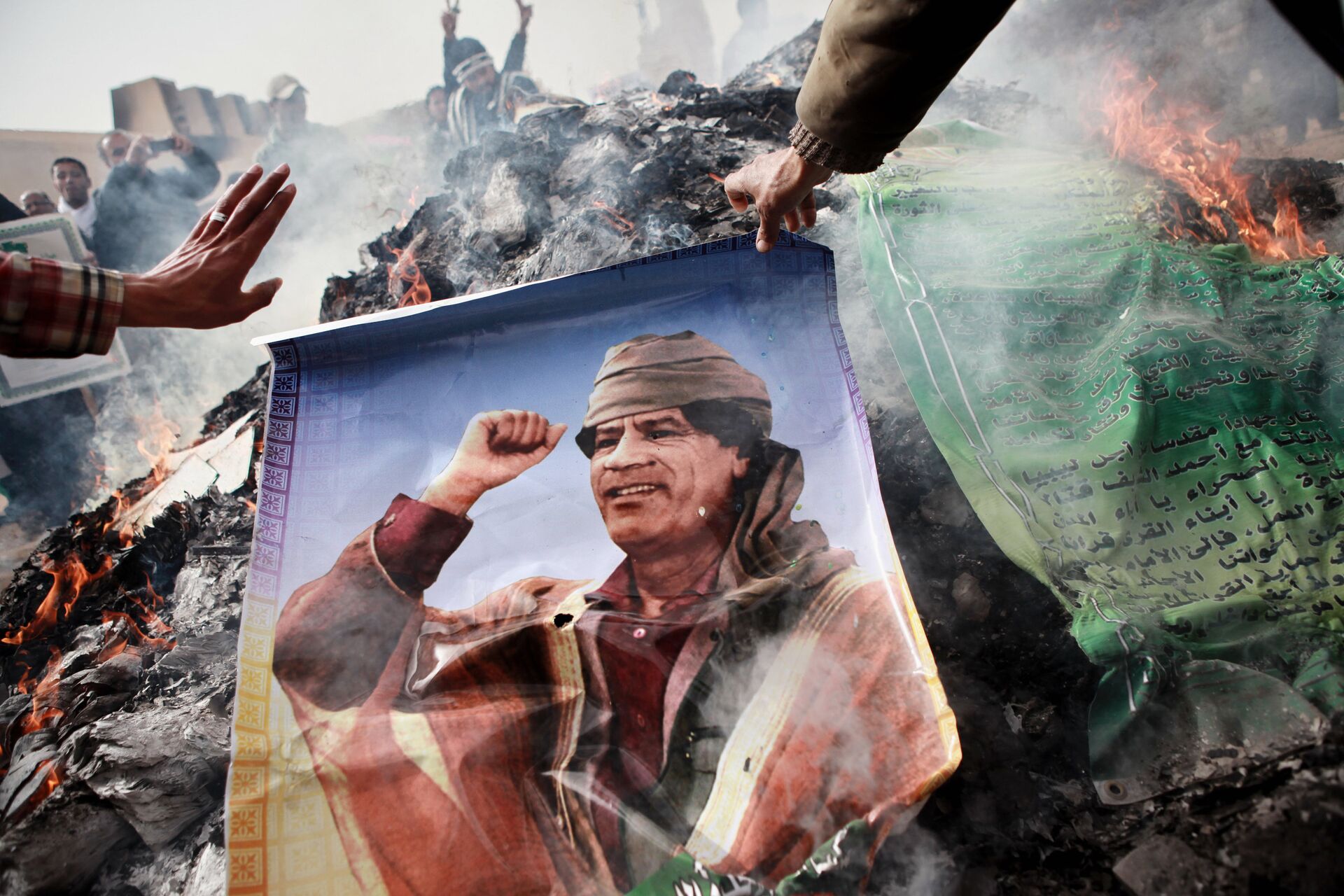https://sputnikglobe.com/20220629/uks-johnson-blames-toxic-masculinity-for-modern-conflicts-despite-lessons-of-history-1096797295.html
UK's Johnson Blames ‘Toxic Masculinity’ for Modern Conflicts Despite Lessons of History
UK's Johnson Blames ‘Toxic Masculinity’ for Modern Conflicts Despite Lessons of History
Sputnik International
Gender stereotypes are hard to dislodge, as proved by a recent rambling episode offered up by UK Prime Minister Boris Johnson. However, time and again, life... 29.06.2022, Sputnik International
2022-06-29T15:47+0000
2022-06-29T15:47+0000
2022-06-29T15:47+0000
boris johnson
vladimir putin
crisis in ukraine
hillary clinton
condoleezza rice
madeleine albright
margaret thatcher
https://cdn1.img.sputnikglobe.com/img/07e4/0c/1c/1081584314_0:177:3013:1871_1920x0_80_0_0_f461b7f0c9d6a4268b743ed26ea968a3.jpg
Boris Johnson, who has been zealously on the frontline of a western effort to prop up the Kiev regime with weapons amid Russia’s special military operation in Ukraine, recently spouted some choice rhetoric.The UK Prime Minister blustered into the tangled web of gender stereotypes as he blamed the crisis in Ukraine on the fact that Russian President Vladimir Putin is a male, and suggesting this was a “perfect example of toxic masculinity”.Despite the obvious fact that the remark could be perceived as wholly inappropriate by today’s gender-conscious society, here are some examples of female political figures whose track record suggests otherwise:Condoleezza RiceRice, who also served as the 43rd POTUS’ secretary of state starting in 2005 until the end of his second term, was one of the architects of the US foray into Iraq.“We went to Iraq to overthrow Saddam Hussein, who we thought was reconstituting weapons of mass destruction, and who we knew had been a threat in the region. It was a security problem," stated Rice at a meeting at the Brookings Institution in 2017.Rice’s remarks regarding the real motivation behind America's invasion of Iraq came in glaring contrast to the oft-cited Bush-era mantra that the US was “spreading freedom and democracy”.Throughout 2003 and in subsequent years, Rice touted a "generational commitment to helping the people of the Middle East to transform their region".In 2003, the United States and its allies invaded Iraq and overthrew the country’s president, Saddam Hussein. Washington justified the invasion by accusing Iraq of developing weapons of mass destruction prohibited in the country after the 1990-91 Gulf War. The US never did find weapons of mass destruction in Iraq, and the war cost the lives of up to a million Iraqis, and nearly 5,000 US, UK and other coalition troops, wounding tens of thousands more. Furthermore, the destabilization caused by the invasion is attributed by analysts to have strengthened the presence of radical Islamist terrorism in the country.Madeleine AlbrightMadeleine Albright, Secretary of State in the second Bill Clinton administration (1997-2001), died on 23 March exactly a day before the 23rd anniversary of the beginning of the US-led NATO blitzkrieg on Serbia and its capital Belgrade, launched on 24 March 1999.Supposedly in defense of Kosovo-Albanians, the NATO aggression - Operation Allied Force – was unequivocally backed by the Clinton administration’s chief hawk on the Balkans. Because of the way she identified herself relentlessly with the push for a western intervention in Kosovo, her critics dubbed the 1998-99 conflict “Madeleine’s War".The NATO incursion did not have any authorization from the UN Security Council even for its pretense of “defending human rights”.During the operation which lasted 78 days, NATO aircraft carried out 10,484 strikes and released 23,614 air munitions, killing at least 2,000 civilians and injuring 12,500. The Clinton administration's bombing campaign targeted not only the Yugoslavian armed forces, but NATO destroyed or damaged some 25,000 residential buildings, 176 cultural monuments and caused up to $100Bln in economic losses, according to some estimates.Margaret ThatcherThe 74-day Falklands War was the perfect opportunity for Margaret Thatcher to cement her reputation in history as the "Iron Lady"'.The conflict helped to boost the popularity of Britain's first female prime minister, who was then floundering under a barrage of sharp criticism from both her cabinet and the public in response to her domestic policies. Government spending cuts and high unemployment were making her political future “shaky”.Argentina and the UK had been locked in a sovereignty dispute over the Falklands Islands/ Las Malvinas since the 19th century.When on 5 April 1982, Argentina's then-dictator General Leopoldo Galtieri tried to seize control of the islands over which Argentina still claims sovereignty, the British government, under Thatcher’s leadership, sent a naval task force 8,000 miles into the South Atlantic. The force was to take on the Argentine forces as a prelude to an amphibious assault on the islands.“We must recover the Falkland islands for Britain and for the people who live there who are of British stock,” Thatcher declaimed.The conflict lasted just a bit more than two months and ended with Argentina's surrender on 14 June 1982. It left 255 British and 649 Argentine soldiers dead, but restored Thatcher's flagging popularity and ushered in a landslide Conservative victory in the 1983 general election.Hillary ClintonOne of the things that Hillary Clinton, who served as the United States' 67th Secretary of State, will be remembered for is her laugh. A harsh, ululating cackle on learning that Muammar Gaddafi, the Libyan leader, had been tortured, sodomised and fatally shot by NATO-backed rebels in October 2011.The incident had been captured on video and broadcast by media networks around the world.The Secretary of State under then-President, Barack Obama, will go down in history equally memorably for the part she played in the war waged by the Washington administration in Libya in 2011 in violation of the War Powers Resolution and despite the official opposition of the US Congress.Gaddafi’s 42-year rule in the oil-rich nation was brought to an end after protests, buoyed by the West, erupted early during the so-called Arab Spring uprisings, started in nearby Tunisia. It was after those protests swiftly took on the form of armed revolt and the Libyan military responded in kind that NATO organized air and cruise missile strikes to give the rebels the upper hand.In 2011, a NATO-led coalition began the 222-day bombing campaign, involving US, French, British, Canadian and Italian forces. Formally, the operation was tasked with enforcing a United Nations resolution imposing a no-fly zone, prohibiting forces loyal to the Libyan leader from carrying out sorties against rebels.In practice, it was a foreign-backed military intervention that resulted in NATO jets attacking thousands of Libyan Army targets, killing as many as 2,000 civilians.The campaign to overthrow the country’s government succeeded, and Gaddafi was eventually captured.On live video, Gaddafi was beaten by his rebel captors and sodomized with a bayonet before he died. Later that day, then-US Secretary of State Hillary Clinton was informed of Gaddafi’s death during an interview."We came, we saw, he died," she laughed, as she put her inimitably cruel spin on the boast made by ancient Roman conqueror Julius Caesar after the battle of Zela (today Tokat province in northern Turkey) when he conquered the Kingdom of Pontus in 47 BCE.
https://sputnikglobe.com/20170512/rice-admits-reason-for-iraq-invasion-1053557895.html
https://sputnikglobe.com/20220325/praising-warmonger-albright-reveals-brain-dead-western-media-1094188528.html
https://sputnikglobe.com/20220324/how-us-nato-illegal-bombing-of-yugoslavia-undermined-rule-of-law-in-the-world-23-years-ago-1094157612.html
https://sputnikglobe.com/20220614/uk-wanted-to-siphon-off-potential-falklands-oil-revenue-declassified-docs-say-1096300112.html
https://sputnikglobe.com/20210215/there-was-no-revolution-libyans-reflect-on-decade-of-chaos-that-followed-gaddafis-ouster-1082084421.html
Sputnik International
feedback@sputniknews.com
+74956456601
MIA „Rosiya Segodnya“
2022
News
en_EN
Sputnik International
feedback@sputniknews.com
+74956456601
MIA „Rosiya Segodnya“
Sputnik International
feedback@sputniknews.com
+74956456601
MIA „Rosiya Segodnya“
boris johnson, vladimir putin, crisis in ukraine, hillary clinton, condoleezza rice, madeleine albright, margaret thatcher
boris johnson, vladimir putin, crisis in ukraine, hillary clinton, condoleezza rice, madeleine albright, margaret thatcher
UK's Johnson Blames ‘Toxic Masculinity’ for Modern Conflicts Despite Lessons of History
Gender stereotypes are hard to dislodge, as proved by a recent rambling episode offered up by UK Prime Minister Boris Johnson. However, time and again, life has proved such frivolous type-casting to be erroneous.
Boris Johnson, who has been zealously on the frontline of a western effort to prop up the Kiev regime
with weapons amid Russia’s special military operation in Ukraine, recently spouted some choice rhetoric.
The UK Prime Minister blustered into the tangled web of gender stereotypes as he blamed the crisis in Ukraine on the fact that Russian President Vladimir Putin is a male, and suggesting this was a “perfect example of toxic masculinity”.
“If Putin were a woman, which he obviously isn’t, if he were, I really don’t think he would have embarked on a crazy, macho war of invasion and violence in the way that he has. If you want a perfect example of toxic masculinity, it’s what he is doing in Ukraine,” quipped Johnson in an interview with German broadcaster ZDF after the G7 summit in the Bavarian Alps.
Despite the obvious fact that the remark could be perceived as wholly inappropriate by today’s gender-conscious society, here are some examples of female political figures whose track record suggests otherwise:
“We didn’t go to Iraq to bring democracy,” Condoleezza Rice, who served as President George W Bush's national security advisor in the run-up to the 2003 US invasion of that country, brashly admitted in 2011.
Rice, who also served as the 43rd POTUS’ secretary of state starting in 2005 until the end of his second term, was one of the architects of the
US foray into Iraq.
“We went to Iraq to overthrow Saddam Hussein, who we thought was reconstituting weapons of mass destruction, and who we knew had been a threat in the region. It was a security problem," stated Rice at a meeting at the Brookings Institution in 2017.
Rice’s remarks regarding the real motivation behind America's invasion of Iraq came in glaring contrast to the oft-cited Bush-era mantra that the US was “spreading freedom and democracy”.
Throughout 2003 and in subsequent years, Rice touted a "generational commitment to helping the people of the Middle East to transform their region".
In 2003, the United States and its allies invaded Iraq and overthrew the country’s president, Saddam Hussein. Washington
justified the invasion by accusing Iraq of developing weapons of mass destruction prohibited in the country after the 1990-91 Gulf War.
The US never did find weapons of mass destruction in Iraq, and the war cost the lives of up to a million Iraqis, and nearly 5,000 US, UK and other coalition troops, wounding tens of thousands more. Furthermore, the destabilization caused by the invasion is attributed by analysts to have strengthened the presence of radical Islamist terrorism in the country.
Madeleine Albright, Secretary of State in the second Bill Clinton administration (1997-2001), died on 23 March exactly a day before the 23rd anniversary of the beginning of the
US-led NATO blitzkrieg on Serbia and its capital Belgrade, launched on 24 March 1999.
Supposedly in defense of Kosovo-Albanians, the NATO aggression - Operation Allied Force – was unequivocally backed by the Clinton administration’s chief hawk on the Balkans. Because of the way she identified herself relentlessly with the push for a western intervention in Kosovo, her critics dubbed the 1998-99 conflict “Madeleine’s War".
The NATO incursion did not have any authorization from the UN Security Council even for its pretense of “defending human rights”.
During the operation which lasted 78 days, NATO aircraft carried out 10,484 strikes and released 23,614 air munitions, killing at least 2,000 civilians and injuring 12,500. The Clinton administration's bombing campaign targeted not only the Yugoslavian armed forces, but NATO destroyed or damaged some 25,000 residential buildings, 176 cultural monuments and caused up to $100Bln in economic losses, according to some estimates.
“She will be remembered in Serbia as a ruthless woman, one of the loudest advocates of the bombing of Yugoslavia and the independence of Kosovo,” the pro-government Vecernje Novosti newspaper said after her death.
The 74-day
Falklands War was the perfect opportunity for Margaret Thatcher to cement her reputation in history as the "Iron Lady"'.
The conflict helped to boost the popularity of Britain's first female prime minister, who was then floundering under a barrage of sharp criticism from both her cabinet and the public in response to her domestic policies. Government spending cuts and high unemployment were making her political future “shaky”.
Argentina and the UK had been locked in a sovereignty dispute over the Falklands Islands/ Las Malvinas since the 19th century.
When on 5 April 1982, Argentina's then-dictator General Leopoldo Galtieri tried to seize control of the islands over which Argentina still claims sovereignty, the British government, under Thatcher’s leadership, sent a naval task force 8,000 miles into the South Atlantic. The force was to take on the Argentine forces as a prelude to an amphibious assault on the islands.
“We must recover the Falkland islands for Britain and for the people who live there who are of British stock,” Thatcher declaimed.
The conflict lasted just a bit more than two months and ended with Argentina's surrender on 14 June 1982. It left 255 British and 649 Argentine soldiers dead, but restored Thatcher's flagging popularity and ushered in a landslide Conservative victory in the 1983 general election.
"When you are at war you cannot allow the difficulties to dominate your thinking: you have to set out with an iron will to overcome them… And anyway what was the alternative? That a common or garden dictator should rule over the Queen's subjects and prevail by fraud and violence? Not while I was prime minister," Thatcher wrote in The Downing Street Years, her 1993 memoir.
One of the things that Hillary Clinton, who served as the United States' 67th Secretary of State, will be remembered for is her laugh. A harsh, ululating cackle on learning that Muammar Gaddafi, the Libyan leader, had been tortured, sodomised and fatally shot by
NATO-backed rebels in October 2011.
The incident had been captured on video and broadcast by media networks around the world.
The Secretary of State under then-President, Barack Obama, will go down in history equally memorably for the
part she played in the war waged by the Washington administration in Libya in 2011 in violation of the War Powers Resolution and despite the official opposition of the US Congress.
Gaddafi’s 42-year rule in the oil-rich nation was brought to an end after protests, buoyed by the West, erupted early during the so-called Arab Spring uprisings, started in nearby Tunisia. It was after those protests swiftly took on the form of armed revolt and the Libyan military responded in kind that NATO organized air and cruise missile strikes to give the rebels the upper hand.
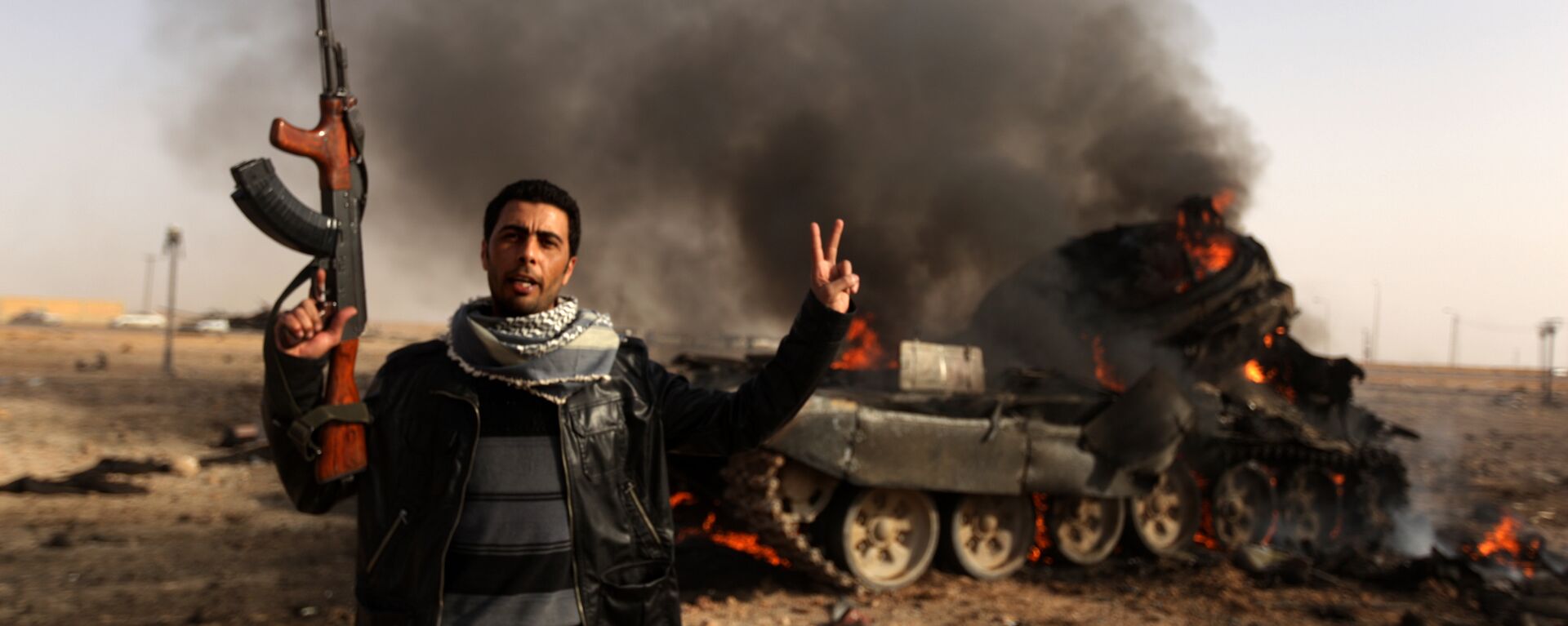
15 February 2021, 16:10 GMT
In 2011, a NATO-led coalition began the 222-day bombing campaign, involving US, French, British, Canadian and Italian forces. Formally, the operation was tasked with enforcing a United Nations resolution imposing a no-fly zone, prohibiting forces loyal to the Libyan leader from carrying out sorties against rebels.
In practice, it was a foreign-backed military intervention that resulted in NATO jets attacking thousands of Libyan Army targets, killing as many as 2,000 civilians.
The campaign to overthrow the country’s government succeeded, and Gaddafi was eventually captured.
On live video, Gaddafi was beaten by his rebel captors and sodomized with a bayonet before he died. Later that day, then-US Secretary of State Hillary Clinton was informed of Gaddafi’s death during an interview.
"We came, we saw, he died," she laughed, as she put her inimitably cruel spin on the boast made by ancient Roman conqueror Julius Caesar after the battle of Zela (today Tokat province in northern Turkey) when he conquered the Kingdom of Pontus in 47 BCE.
